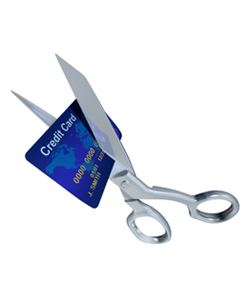| Canceling a Credit Card |

Have you thought about canceling a credit card that is collecting dust in your dresser drawer? Or one that has been used so often you have the card number memorized? While closing a card sometimes makes sense, other times, it may do more harm than good. The following are some factors that are helpful to consider when deciding whether or not to cancel a credit card:
- Fees: What will it cost you to keep the account open? Having a high interest rate does not necessarily matter because closing the account will not lower the interest rate on an existing balance (and you are not charged any interest if you pay off your balance in full each month). What is important is whether you are charged an annual fee and/or an inactivity fee. If you are new to credit or have a negative credit history, you may be hard-pressed to get approved for a card that does not charge these types of fees. However, if you have a good credit history, it may not make sense to keep a card that costs you money even if you pay your balance in full on time each month.
- Ability to use credit without getting into debt: If you have struggled to control your spending in the past, consider if there are ways you can avoid overusing the cards short of canceling them. For example, can you leave them at home most of the time and only take them out once a month to buy a pack of gum or something else cheap? (You could keep also just keep an account open and not use it, but by doing this, you do not continue to build a positive payment history and also risk the account being closed by the creditor due to inactivity.) Honestly assess your capabilities and limitations.
- Effect on credit score: Closing an account does not have an immediate effect on your payment history, which makes up 35% of your FICO credit score, since positive information for closed accounts typically stays on your credit report for ten years (seven for negative information). However, it can have a significant impact on the factor that looks at credit utilization (balances owed/credit limits), which accounts for 30% of your credit score. To have a good score, it is best to have a credit utilization ratio under 50%. If the amount owed relative to the credit limit is low for all of your accounts, then closing one account probably won’t have much of an effect (assuming you have multiple accounts). Conversely, if you have high balances, closing an account with a decent credit line can cause your score to plunge. If you fall into the second category, consider if having a good credit score is necessary right now. If you are applying for a mortgage or car loan in the next few months, it probably is. If you do not plan to get credit soon and feel that the only way to stay debt free is to close your cards, then that may be the best option, even if your credit score will suffer.
|
|
|


